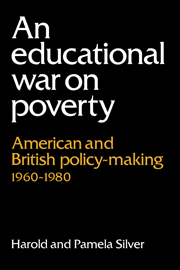Book contents
- Frontmatter
- Contents
- Acknowledgments
- List of abbreviations
- 1 Introduction: a proper complexity
- Part I A pattern of events: United States
- 2 Poverty and education: changing concerns and concepts
- 3 Education: children and intervention
- 4 Learning their way out of poverty?
- 5 Education and the prime target
- 6 An effort to understand
- Part II A pattern of events: Britain
- Part III Following through
- Interviews and consultation
- Bibliography
- Index
3 - Education: children and intervention
Published online by Cambridge University Press: 03 October 2009
- Frontmatter
- Contents
- Acknowledgments
- List of abbreviations
- 1 Introduction: a proper complexity
- Part I A pattern of events: United States
- 2 Poverty and education: changing concerns and concepts
- 3 Education: children and intervention
- 4 Learning their way out of poverty?
- 5 Education and the prime target
- 6 An effort to understand
- Part II A pattern of events: Britain
- Part III Following through
- Interviews and consultation
- Bibliography
- Index
Summary
Just as policies relating to poverty have a long and elusive history, so do theories and innovations relating to early childhood education. The two histories have never converged as formidably as they did in the United States in the late 1950s and 1960s. Never has psychologist spoken so directly with politician, educator with policy maker. To attempt to explain this convergence is to face the historical problem of continuity and discontinuity, the relationship between the event and the long process. The nature of the relationships between research and experiment in the field of early childhood, the roles of researchers and funding agencies, the emergence of policy issues and political needs, the transition from private endeavour to public policy, are all basic to the exploration of the 1960s. This is especially true in the preliminary phases of the American developments here under discussion, but they are true also of Britain – with a different typology of participants. The main elements in the analysis for this chapter are threefold – the work on early childhood and related experiments, the involvement of the Ford Foundation, and the Kennedy administration. A further element, the educational components of the war on poverty from 1964, are the substance of the following chapter.
A European and American interest in the education of young children emerged in the nineteenth century, primarily in relation to various forms of ‘ rescue’ – rescue from inappropriate formal schooling, rescue from the ignorance and dangers (to individuals and to the social order) of urban conditions, rescue from breakdowns of family, church and other forms of authority which accompanied the transition from a predominantly rural society.
- Type
- Chapter
- Information
- An Educational War on PovertyAmerican and British Policy-making 1960–1980, pp. 30 - 69Publisher: Cambridge University PressPrint publication year: 1991



